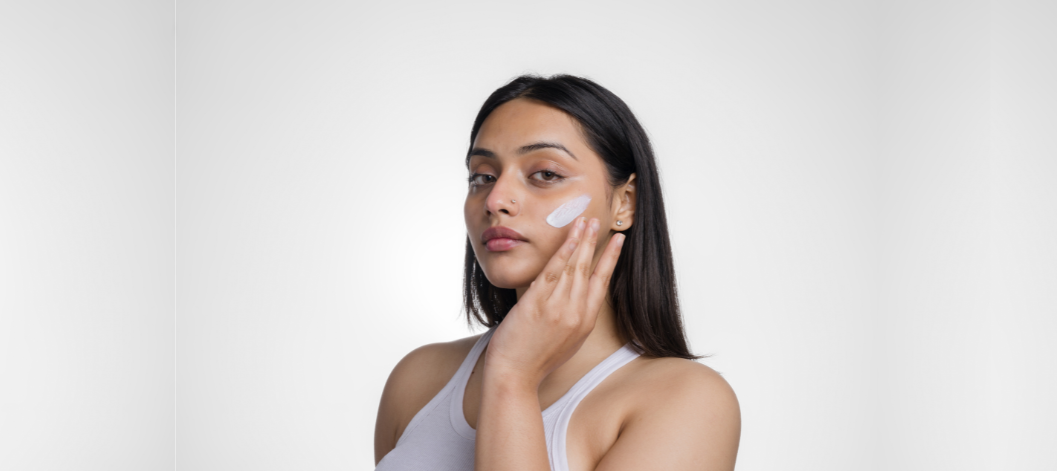Choosing the right skincare product for oily or acne-prone skin can be tricky—one misstep can disrupt your entire routine.
It’s not just about choosing something labeled "oil-free" or "for acne-prone skin." The formulation matters.
A functional product for oily skin must check multiple scientific boxes:
✓ Lightweight, so it doesn’t feel suffocating
✓ Non-comedogenic, so it doesn’t clog pores
✓ Fast-absorbing, so it integrates seamlessly with the skin
✓ Gentle, so it doesn’t trigger irritation
✓ and sebum-regulating, so it actively controls oil production rather than just masking it.
But even when all these criteria are met, there’s another frustrating issue: how the product behaves once applied.
If you have oily skin, you’ve likely experienced that unsettling, greasy layer that appears after applying sunscreen—especially when you start sweating.
The cake-y, heavy feeling that makes you want to wash your face immediately.
So, why does this happen?
The frustrating part is that skipping sunscreen isn’t an option.
UV exposure leads to oxidative stress, accelerates skin ageing, and worsens post-inflammatory hyperpigmentation (a major concern for acne-prone individuals).
In summer, stepping outside without proper sun protection is practically an invitation for skin damage.
But there’s a solution. In this blog, we’ll talk about the science behind why sunscreen makes your skin sweat—and, more importantly, what you can do to prevent it.
Why does sunscreen cause sweating?
The relationship between sunscreen and sweating isn’t as straightforward as it seems—it’s a matter of thermoregulation and skin barrier dynamics.
Sweating is primarily a response to heat, regardless of whether sunscreen is applied.
However, what changes is how that sweat behaves on the skin.
When sweat evaporates efficiently, it cools the body, and you may not perceive excessive sweating.
But when evaporation is hindered—due to occlusive sunscreen ingredients, increased skin surface temperature, or altered skin permeability—sweat accumulates, making the skin feel wetter than usual.
This leads to the common misconception that sunscreen directly increases sweat production, when in reality, it’s altering the rate of sweat evaporation.
Here are two more reasons -
1. Occlusion Effect
Sunscreens, especially those with occlusive agents like silicones, waxes, and certain emollients, form a barrier on the skin.
While this barrier is essential for UV protection, it also reduces transepidermal water loss (TEWL) and traps heat.
When heat cannot dissipate efficiently, the body responds by producing more sweat to regulate temperature.
2. pH and Sweat interaction can trigger hyperhidrosis
The skin’s natural pH is slightly acidic (around 4.5-5.5), whereas some sunscreens have a higher or lower pH depending on their formulation.
This pH shift can irritate sweat glands or disrupt normal eccrine function, especially in individuals prone to reactive sweating (hyperhidrosis).
Are sweat and water-resistant sunscreen more suitable in summer?
Sunscreen does not prevent sweating—nor is there a way to completely stop sweat production after applying it.
Sweat is a physiological response regulated by the eccrine glands to maintain body temperature.
If heavy sweating is a concern, sunscreens labeled sweat-resistant or water-resistant are often considered as the ideal choice for summer.
But does science support this?
Yes. The primary function of these formulations is to maintain UV protection despite perspiration or water exposure.
Standard sunscreens may degrade or wash away when exposed to moisture, reducing their effectiveness.
A study published in Journal of the american academy of Dermatology states that sunscreens designed to be water and sweat-resistant do not wash off the protection needed—even after sweating.
The study also confirms that these sunscreens do not impede natural sweating and are safe for outdoor use.
The most effective way to apply sunscreen in summer—backed by science
Sunscreen application isn’t just about smearing a layer and hoping for the best.
The how and when matter just as much as the what.
Here’s a precise, research-backed method to ensure maximum UV protection:
Choose the right sunscreen for your skin type
Not all sunscreens are created equal.
To ensure optimal protection, choose a formula that meets these criteria:
- SPF 50 – Blocks 98% of UVB rays, reducing the risk of sunburn and DNA damage.
- Broad-Spectrum – Protects against UVA (causes premature aging) and UVB (causes burns).
- Water & Sweat-Resistant – Essential for humid conditions or outdoor activities; remains effective for 40-80 minutes in water.
Apply at least 15 Minutes before sun exposure
Sunscreen doesn’t work instantly. Chemical sunscreens need time to absorb and neutralize UV radiation, while mineral sunscreens (like zinc oxide, titanium dioxide) require settling to form an even protective barrier.
Use the right amount—most people apply too little
Applying too little sunscreen drastically reduces its effectiveness.
Studies show that most people apply only 25-50% of the required amount, which lowers the actual SPF protection significantly.
Apply two finger length sunscreen on your face and neck.
Pro tip: Layer it instead of rubbing aggressively to ensure even coverage.
Reapply every 4 hours
A common misconception is that sunscreen lasts all day.
In reality, UV filters degrade with sun exposure, sweat, and touch. Even high-SPF sunscreens lose effectiveness over time.
Reapplication Rules:
- Every 4 hours under normal conditions
- Every 40-80 minutes if sweating or swimming (check the label)















